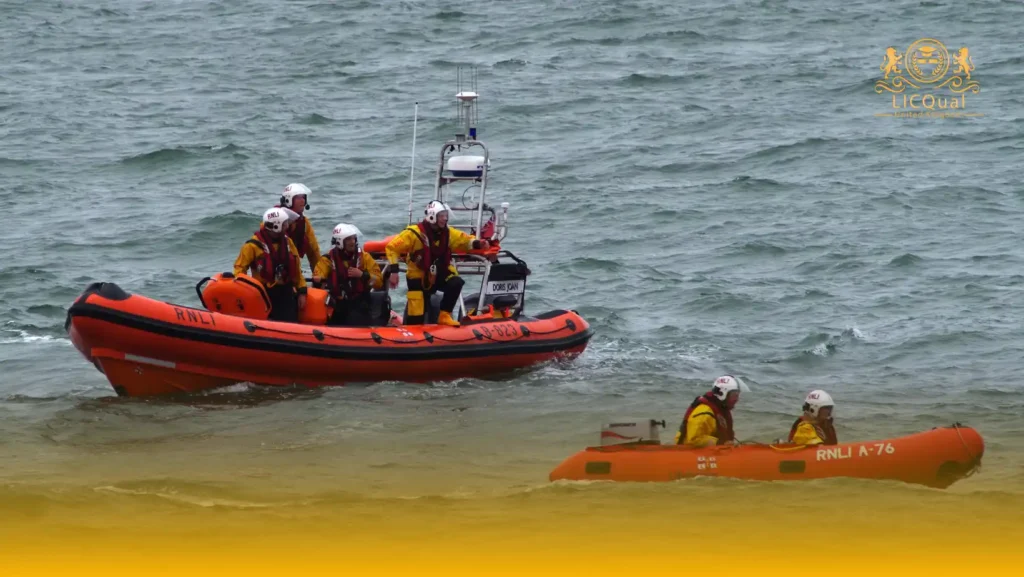The LICQual Level 4 Award in NRASTC / ATPRA Trainer Assessor is a highly specialized qualification designed for experienced aquatic safety professionals who aspire to become certified trainers and assessors in the National Rescue Award for Swimming Teachers and Coaches (NRASTC) and Aquatic Therapy Pool Rescue Award (ATPRA). This internationally recognized program equips participants with the advanced skills, assessment methodologies, and instructional techniques required to train and evaluate candidates to the highest industry standards.
Through a blend of theoretical learning and practical application, candidates will develop expertise in creating engaging training sessions, delivering assessments effectively, and ensuring compliance with internationally recognized water safety regulations. The course covers essential areas such as rescue protocols, risk assessment, health and safety legislation, and effective communication for trainer-assessors.
This qualification is ideal for individuals seeking to progress their career in aquatic safety, swimming instruction, or pool rescue training. It enables successful graduates to not only deliver NRASTC and ATPRA courses but also maintain the quality and consistency of water safety training across educational, recreational, and therapeutic aquatic environments.
By earning this qualification, professionals demonstrate their commitment to excellence, safety, and the highest teaching standards in aquatic rescue training—making them valuable assets to leisure centers, swimming schools, therapy facilities, and aquatic training organizations worldwide.
Course Overview
Qualification Title
LICQual Level 4 Award in NRASTC / ATPRA Trainer Assessor
Total Units
6
Total Credits
12
GLH
36
Qualification #
LICQ2200611
Qualification Specification
To enroll in the LICQual Level 4 Award in NRASTC / ATPRA Trainer Assessor, applicants must meet the following criteria:
|
Qualification# |
Unit Title |
Credits |
GLH |
|---|---|---|---|
|
LICQ2200611-1 |
Introduction to NRASTC / ATPRA Trainer Assessor Role |
2 |
6 |
|
LICQ2200611-2 |
Lifesaving, Rescue, and Emergency Response Techniques |
2 |
6 |
|
LICQ2200611-3 |
Risk Assessment and Safety Management in Aquatic Environments |
2 |
6 |
|
LICQ2200611-4 |
Training Delivery and Assessment Methods |
2 |
6 |
|
LICQ2200611-5 |
Communication and Learner Support |
2 |
6 |
|
LICQ2200611-6 |
Quality Assurance and Continuous Professional Development (CPD) |
2 |
6 |
By the end of this course, learners will be able to:
1. Introduction to NRASTC / ATPRA Trainer Assessor Role
By the end of this unit, learners will be able to:
- Explain the scope, responsibilities, and ethical requirements of the NRASTC/ATPRA Trainer Assessor role.
- Interpret relevant national and international standards, regulations, and guidelines for aquatic safety training.
- Demonstrate an understanding of the certification, revalidation, and compliance processes.
- Apply professional conduct, safeguarding, and duty-of-care principles in aquatic training environments.
2. Lifesaving, Rescue, and Emergency Response Techniques
By the end of this unit, learners will be able to:
- Demonstrate advanced lifesaving and rescue skills in aquatic environments.
- Apply correct use of rescue equipment and personal protective devices during simulated and real incidents.
- Perform cardiopulmonary resuscitation (CPR) and first aid in line with international lifesaving protocols.
- Execute safe and effective casualty recovery, evacuation, and handover procedures to emergency services.
3. Risk Assessment and Safety Management in Aquatic Environments
By the end of this unit, learners will be able to:
- Identify potential hazards in swimming pools and open water environments.
- Conduct structured risk assessments using recognised safety frameworks.
- Develop and implement operational safety procedures to minimise risks.
- Evaluate the effectiveness of safety management systems and recommend improvements.
4. Training Delivery and Assessment Methods
By the end of this unit, learners will be able to:
- Plan, structure, and deliver engaging aquatic safety training sessions.
- Apply a variety of instructional techniques to meet diverse learner needs.
- Assess learner competence using valid, reliable, and fair assessment tools.
- Provide constructive feedback that promotes learner improvement and confidence.
5. Communication and Learner Support
By the end of this unit, learners will be able to:
- Apply effective verbal and non-verbal communication techniques in training contexts.
- Adapt communication styles to suit different learning needs, abilities, and cultural backgrounds.
- Provide guidance, support, and encouragement to promote learner engagement.
- Handle challenging learner situations professionally and inclusively.
6. Quality Assurance and Continuous Professional Development (CPD)
By the end of this unit, learners will be able to:
- Apply internal and external quality assurance processes in training and assessment.
- Maintain accurate training and assessment records in compliance with awarding body requirements.
- Reflect on personal performance and identify areas for professional growth.
- Develop and implement a CPD plan to maintain currency and competence in aquatic training.
The LICQual Level 4 Award in NRASTC / ATPRA Trainer Assessor is designed for professionals who want to specialize in swimming and aquatic safety training while gaining accredited teaching and assessment skills. This course is perfect for individuals looking to train and evaluate learners in aquatic environments with confidence, professionalism, and global recognition. Whether you are a swimming instructor, lifeguard, or safety officer, this qualification helps you become a certified trainer and assessor.
1. Swimming Instructors and Coaches
- Ideal for instructors seeking to enhance teaching and assessment skills.
- Develops ability to deliver structured and effective swimming lessons.
- Provides techniques to assess learner progress accurately.
- Enhances professional credibility in aquatic training.
- Prepares instructors for accredited NRASTC / ATPRA training programs.
2. Lifeguards and Rescue Professionals
- Perfect for lifeguards looking to advance into training roles.
- Builds expertise in assessing aquatic rescue competencies.
- Teaches structured lesson planning and delivery for safety skills.
- Strengthens emergency response teaching abilities.
- Recognized internationally for career advancement.
3. Aquatic Safety Officers and Facility Managers
- Designed for managers overseeing swimming pools and aquatic centers.
- Enables training of staff in safety protocols and emergency procedures.
- Helps implement consistent assessment and training standards.
- Improves team preparedness for aquatic emergencies.
- Provides professional qualification to enhance facility credibility.
4. Corporate and Workplace Trainers
- Suitable for professionals delivering health and safety programs.
- Enhances skills in planning and assessing workplace swimming or water safety courses.
- Supports compliance with organizational safety standards.
- Improves staff competency in aquatic emergency response.
- Provides certified qualification for professional development.
5. Community Educators and Volunteer Trainers
- Ideal for individuals working in schools, NGOs, or community centers.
- Provides tools to teach water safety effectively to diverse groups.
- Builds ability to assess learners of different ages and skill levels.
- Encourages leadership in community aquatic programs.
- Promotes safer swimming environments through certified instruction.
6. Career Changers Entering Aquatic Training
- Perfect for professionals transitioning into swimming instruction or safety roles.
- Offers a structured pathway to gain accredited trainer and assessor skills.
- Covers both teaching methodology and learner assessment practices.
- Provides confidence to deliver lessons and evaluate performance professionally.
- Expands career opportunities in education, safety, and training sectors.
7. Health and Safety Professionals
- Tailored for professionals responsible for occupational aquatic safety.
- Strengthens expertise in risk assessment and emergency response.
- Teaches assessment of employee competencies in water safety.
- Supports training program compliance with national and international standards.
- Adds a Level 4 qualification for enhanced professional credibility.
The LICQual Level 4 Award in NRASTC / ATPRA Trainer Assessor prepares a wide range of professionals to lead, teach, and assess aquatic safety training with confidence, skill, and global recognition.
Assessment and Verification
All units within this qualification are subject to internal assessment by the approved centre and external verification by LICQual. The qualification follows a criterion-referenced assessment approach, ensuring that learners meet all specified learning outcomes.
To achieve a ‘Pass’ in any unit, learners must provide valid, sufficient, and authentic evidence demonstrating their attainment of all learning outcomes and compliance with the prescribed assessment criteria. The Assessor is responsible for evaluating the evidence and determining whether the learner has successfully met the required standards.
Assessors must maintain a clear and comprehensive audit trail, documenting the basis for their assessment decisions to ensure transparency, consistency, and compliance with quality assurance requirements.







